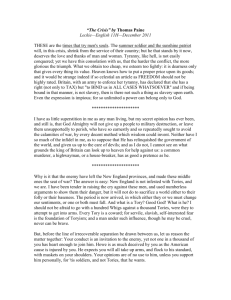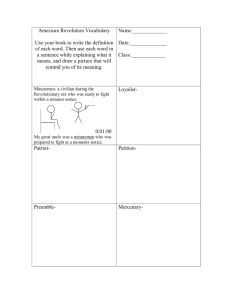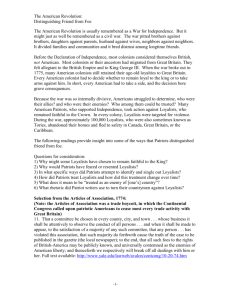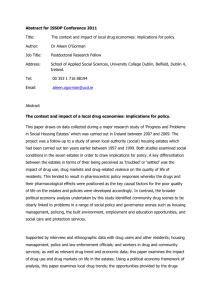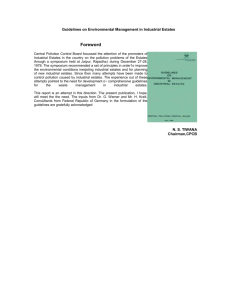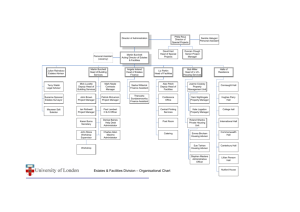Title: Patriots vs - School District of Osceola County
advertisement
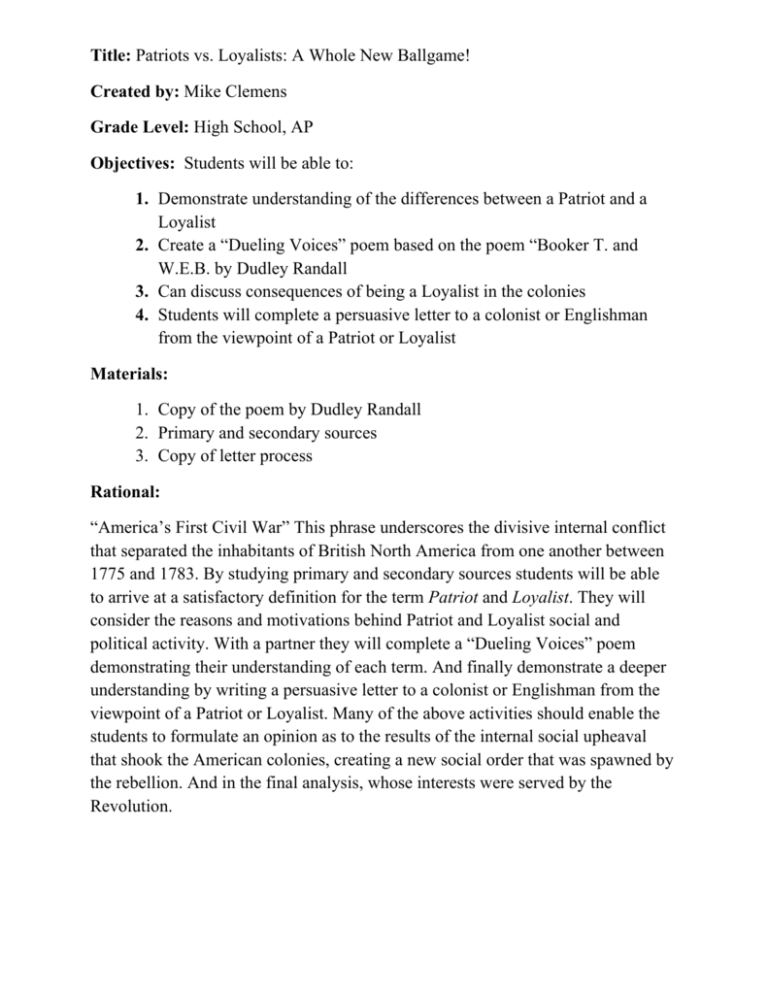
Title: Patriots vs. Loyalists: A Whole New Ballgame! Created by: Mike Clemens Grade Level: High School, AP Objectives: Students will be able to: 1. Demonstrate understanding of the differences between a Patriot and a Loyalist 2. Create a “Dueling Voices” poem based on the poem “Booker T. and W.E.B. by Dudley Randall 3. Can discuss consequences of being a Loyalist in the colonies 4. Students will complete a persuasive letter to a colonist or Englishman from the viewpoint of a Patriot or Loyalist Materials: 1. Copy of the poem by Dudley Randall 2. Primary and secondary sources 3. Copy of letter process Rational: “America’s First Civil War” This phrase underscores the divisive internal conflict that separated the inhabitants of British North America from one another between 1775 and 1783. By studying primary and secondary sources students will be able to arrive at a satisfactory definition for the term Patriot and Loyalist. They will consider the reasons and motivations behind Patriot and Loyalist social and political activity. With a partner they will complete a “Dueling Voices” poem demonstrating their understanding of each term. And finally demonstrate a deeper understanding by writing a persuasive letter to a colonist or Englishman from the viewpoint of a Patriot or Loyalist. Many of the above activities should enable the students to formulate an opinion as to the results of the internal social upheaval that shook the American colonies, creating a new social order that was spawned by the rebellion. And in the final analysis, whose interests were served by the Revolution. Procedure: 1. Introduce the topic by placing a transparency on the overhead showing the tar and feathering of a British Tax Collector. Ask the students to identify the characters in the overhead and introduce two new terms: Patriot and Loyalist by placing them on the board. Hold a brief discussion asking student to define these terms. Explain to the students that these terms represent more than just definitions, that they represent a social upheaval in America. Assign appropriate reading in the textbook as background knowledge. 2. Introduce the writing of the poem: a. Ask students to define the word “dueling”, list responses on the board and discuss. b. Explain that the students will be writing “Dueling Poetry” c. The “Duel” will be between pairs of students – in each pair, one student will represent a Patriot, who will discuss his loyalty to the 13 Colonies, while the other will be a Loyalist and explain their loyalty to the Crown. d. The poem will follow the format of “Booker T. and W.E.B.” which lends its structure to dueling voices. Distribute the poem and chose two students to read to the class. e. Discuss the poem making clear to the students that content, as well as voice and word choice, is important in this style of poetry. f. Distribute basic knowledge information to all students. g. Answer and questions, then allow students to work, remainder of class period 3. The next class meeting should allow time for pairs to meet, discuss and fine tune their poems. 4. Have volunteers read their poems, when all groups have finished list reasoning on the board and discuss. 5. Introduction of writing activity (Extension #1) a. Discuss the topic of Persuasive Writing; make sure to point out the difference between reason/logic and emotion. Use examples from real life. b. This follow-up activity will take several days to complete as several steps are involved c. Distribute to students the hand-outs and web sites: The Case of The American Loyalists briefly stated. Loyalist vs. Patriot Document Set 3 The Fate of the Loyalists: The Other American, pages at end of document http://www.zuska.simplenet.com/USProjects/DBQs1999/MyD BQ-1999-RevolutionAsCivilWar.htm http://jefferson.village.virginia.edu/seminar/unit1/part3.html The Patriots and General American Revolution Sites http://lcweb2.loc.gov/ammem/mcchtml/corhome.html Words and Deeds in American History 6. Rough Draft #1(Focus-Ideas to Paper/Brainstorming) a. Students are to write a letter (as either a Patriot or Loyalist) to someone on the other side, in order to convince them that their side is the side to be on when the Revolution starts. b. Step One; Create a list of examples/details/evidence to help support your point of view c. Read through your notes on Persuasive Writing d. Write your letter using proper format e. In class student will read their rough draft and pull out the key points using the Persuasive Letter Outline. Students are to jot down a few notes about their weaknesses on this draft. Students will then turn in this draft and write a brand new rough draft. It may be very similar. It can be different. 7. Rough Draft #2 (Focus-Ideas to Paper) a. Write another draft from the same perspective ( 1 evening) b. Complete persuasive letter outline for draft #2 8. Rough Draft #3(Focus-Revision/Self and Peer) a. Using rough draft #1 and rough draft #2, combine best elements to create rough draft #3 (1 evening) b. Use Persuasive Letter Rubric (see Handouts) to check rough draft #3 c. Use Persuasive Letter Rubric to have students peer review draft #3. Peer reads silently to self, uses rubric to revise. d. Write rough draft #4 using suggestions and changes from self and peer revisions.(1 evening) 9. Rough Draft #4 (Focus-Editing) a. Follow Editing guidelines – Read backwards for spelling, highlight all verbs- show action, appositives and adding more info. b. Have peer edit paper for same items c. Peer discussion about last minute changes, ideas, questions 10. Final Copy a. Type or handwrite (Legible) your final copy. (I evening) 11. As a culminating activity (Extension #2) using Document Set 3 students should answer the following questions: a. If, as one classical scholar writes, “loyalty is the holiest good in the human breast,” why were American loyalists vilified and regarded with contempt? b. How do you react to the actions taken, both official and private, against the Tories (Loyalists)? To what extent were the patriots justified in their behavior? In what ways to the documents clarify the reasons for the patriots’ decisions? c. What was the responsibility of England to those loyal subjects who supported the crown during the Revolution? To what extent did the British government accept that obligation? What were the consequences for the Tories? In what ways were their needs met in the post-Revolutionary era? With what results? d. All answers will be collected, graded, and discussed in class as a final activity. Evaluation: One well written, well organized, and well reasoned essay. As an extension students are evaluated on a follow-up activity by answering question concerning the fate of the Loyalists. TAH Grant Reference: this lesson was adopted from a lesson presented by Christine Sink in her teaching of “Manifest Destiny: A Clash Of Cultures”. I used the Dueling Poetry portion and adopted it to Patriot vs. Loyalist and added the extension by having my student write a persuasive letter and doing a follow-up by answering questions concerning The Fate of the Loyalists. Standards: Using The Next Generation Sunshine State Standards SS.912.A.1.1 SS.912.A.1.1 Habits of the Mind: *What’s Important and What’s Not *Historical Empathy *Change and Consequences *Evaluating Evidence SS.912.A.1.6 Booker T. and W.E.B. Booker T. Washington and W.E.B. DuBois By Dudley Randall “It seems to me,” said Booker T., “It shows a mighty lot of cheek To study chemistry and Greek When Mister Charlie needs a hand To hoe the cotton on his land And when Miss Ann looks for a cook, Why stick your nose inside a book?” “I don’t agree,” said W.E.B. “If I should have the drive to seek Knowledge of Chemistry or Greek, I’ll do it. Charles and Miss can look Another place for hand or cook, Some men rejoice in skill of hand, And some in cultivating land, But there are others who maintain The right to cultivate the brain” “It seems to me,” said Booker T., “That all you folks have missed the boat Who shout about the right to vote, And spend vain days and sleepless nights In uproar over civil rights. Just keep your mouth shut, do not grouse, But work, and save, and buy a house.” “I don’t agree,” said W.E.B. “For what can properly avail If dignity and justice fail? Unless you help to make the laws, They’ll steal your house with trumped-up clause. A rope’s as tight, a fire as hot, No matter how much cash you’ve got. Speak soft, and try your little plan, But as for me, I’ll be a man.” “It seems to me,” said Booker T“I don’t agree,” Said W.E.B. Document # 1, Set 3 A Maryland Preacher Resists the Patriots, 1775 … In the usual and regular course of preaching, I happened one Sunday to recommend peaceableness; on which Mr. Lee and sundry others, supposing my sermon to be what they called a stroke at the times, rose up and left the church. This was a signal to the people to consider every sermon of mine as hostile to the views and interests of America; and accordingly I never after went into a pulpit without something very disagreeable happening. I received sundry messages and letters threatening me with the most fatal consequences if I did not (not desist from preaching at all, but) preach what should be agreeable to the friends of America. All the answers I gave to these threats was in my sermons, in which I uniformly and resolutely declared that I never could suffer any merely human authority to intimidate me from performing what in my conscience I believed and knew to be my duty to God and his Church. And for more than six months I preached, when I did preach, with a pair of loaded pistols lying on the cushion; having given notice that if any man, or body of men, could possibly be so lost to all sense of decency and propriety as to attempt really to do what had been long threatened, that is, to drag me out of my own pulpit, I should think myself justified before God and man in repelling violence by violence. Jonathan Boucher, ed., Reminiscences of an American Loyalists (Boston: Houghton Mifflin Company, 1925), p. 113 Document #2 Set 3 A New Jersey Artisan is Tarred and Feathered, 1775 From the Records of the Committee of Safety New York, December 28, 1775 The 6th of December, at Quibbletown, Middlesex County, Piscataway Township, New-Jersey, Thomas Randolph, cooper, who had publickly proved himself an enemy to his country, by reviling and using his utmost endeavours to oppose the proceedings of the Continental and Provincial Conventions and Committees, in defence of their rights and liberties; and he, being judged a person of not consequence enough for a severer punishment, was ordered to be stripped naked, well coated with tar and feathers, and carried in a wagon pubickly round the town; which punishment was accordingly inflicted. And as he soon became duly sensible of his offence, for which he earnestly begged pardon, and promised to atone, as far as he was able, by a contrary behaviour for the future, he was released, and suffered to return to his house in less than half an hour. The whole was conducted with that regularity and decorum that ought to be observed in all publick punishments. “From the Records of the Committee of Safety,” New York, December 28, 1775, in Peter Force, ed., American Archives: Fourth Series (Washington, D.C.: St. Claire Clarke and Peter Force, 1837-1846), Vol. 4, p. 203. Document #3 Set 3 The Legislative Attack on the Loyalists, 1777-1782 Laws Amercing, Taxing or Confiscating the Estates of Loyalists or Anticipating such Action New Hampshire November 29, 1777. An act to p r e v e n t the transfer or conveyance of the estates and property of all such persons who have been or shall be apprehended upon suspicion of being guilty of treason, misprision of treason, or other inimical practices respecting this State, the United States, any or either of them, and also for securing all lands within this State as well of such persons as have traitorously deserted, or may hereafter desert the common cause of America, and have gone over to, or in any way or manner joined our enemies, as of those who belong to, or reside in Great Britain…. December 26, 1778. An Act to make void all attachments which have been or hereafter shall be laid or made on the estates of persons who have left this State or any of the United States, and have gone over to the enemies of said States since the commencement of hostilities by Great Britain; or on the estates of any inhabitant or subjects of Great Britain. Preamble.- Whereas such attachments may be made by the collusion of the parties in order to defeat this State of the benefit which may arise from the confiscation of such estates, and to defraud just creditors of their honest demands against such persons…. Rhode Island October, 1775. Act to confiscate and sequester estatres and banish persons of a certain description. (Special acts confiscating special estates are to be found in the Rhode Island records from this date to October of 1783.) October, 1779. An act for confiscating the estates of certain persons therein described. (See “Records of Rhode Island,” Vol. IX., p.461.) New York. October 22, 1779. Act for forfeiture and sales of the estates of persons who have adhered to the enemies of this state…. March 10, 1780. Act for the immediate sale of part of the confiscated estates. (Amended October 7, 1780.) New Jersey. April 18, 1778. An act for taking charge of and leasing real estates and for forfeiting personal estates of certain fugitives and offenders… December 11, 1778. Act for forfeiting to and vesting in the State the real estates of certain fugitives and offenders….(June 26, 1781, an act to suspend the sales, and December 16,1783, an act to continue the sales.) (Supplemented, December 23, 1783) Pennsylvania March 18, 1779 (Provides for the disposition of Joseph Galloway’s house.) North Carolina November, 1777. An act for confiscating the property of all such persons as are inimical to the United States, and of such persons as shall not within a certain time therein mentioned, appear and submit to the State whether they shall be received as citizens… Georgia March 1, 1778. An act for attainting such persons as are herein mentioned, of high treason and for confiscating their estates… for establishing boards of commissioners for the sales of such estates…. (Amended October 30, 1778.) November 15, 1778. An act to compel non-residents to return within a certain time, or in a default…. Their estates to be confiscated. January 11, 1782. An act for the confiscating of the estates of certain persons… and for providing funds for defraying the contingent expenses of this State. Claude Halstead Van Tyne, The Loyalist in the American Revolution (Gloucester, Mass.: Peter Smith, 1959, Appendix C, pp. 335-340. Document #4 Set 3 Grace Growden Galloway Defies the Radicals in Philadelphia, 1778-1779 … (July 22, 1778) SENT FOR Mr Dickison last Night & he told Me he wou’d look over ye law to see if I cou’d recover My own estate & this evening he came & told Me I cou’d Not recover dower & he fear’d my income in My estate was forfeited likewise & yt no trial wou’d be of service: but advised Me to draw up a peti’on to ye Chief Justice Mccean for the recovery of my estate & refused a fee in ye Politest Manner….So I find I am beggar indeed I expect every hour to be turn’d out of doors & where to go I know not. No one will take me in & all ye Men keeps from Me. Was I assured that My husband & child were happy nothing cou’d make me very wretched but I am fled from as a Pestilence. Mrs Jones here in the morn: sent nurse to Parson Combs to desire him to [tell] Mr G of my unhappy situation. [August 10, 1778] Peggy Johns & Becky Redman came in ye Morn, Lewis sent Me word Smith had gave his honour not to Molest Me till the Opinion of ye executive council was known but in a short time after came Peel, Will, & Shriner with a Spanish Merchant & his attendants & took Possession of My house. I was taken very ill & obliged to Lay down & sent them word I cou’d not see them; they went every Where below stairs & ye Spaniard offer’d to let Me chuse My own bed chamber; but I sent them no message but was very ill Up stairs. But between 2 & 3 o’clock the last went away. Peel told Nurse now they have given the Spanish Gentle Man possession they had nothing More to do with it. But they took the Key out of ye parlor door & locked me out… [August 16, 1778]… As I have No friends they [patriot Quakers] treat me as they please. So much for Mr G[Galloway’s] great friends. He has not one who will go out of ye way to serve him. I am in hopes they will let me have my Estate but that will be on my own Account. No favour shown to JG[Joseph Galloway] or his child: Nor has he a friend that will say one word in his favour. I am tired with sending a set of men that always keeps from me when I most need them. Am vex’d. [August 20, 1778] Mrs Edwin & Sideny Howell & Peggy Johns came in ye morn: but cou’d get No man to bear evidence. Lewise sent me word thay I must shut my doors & windows & if they wou’d come to let them Make a forcible Entry. Accordingly I did so & a little after 10 o’clock they Knocked Violently at the door three times. The Third time I sent Nurse & call’d out myself to tell them I was in possession of my own House & wou’d keep so & that they shou’d gain No admittance Hereupon which they went round in ye yard & try’d every door but cou’d None Open. Then they went to the Kitchen door & with a scrubbing brush which they broke to pieces they forced that open, we Women standing in ye Entry in ye Dark. They made repeated strokes at the door & I think was 8 or 10 minutes before they got it open. When they came in I had ye windows open’d they look’d very Mad. Their was Peel, Smith, ye Hatter, & a Col Will, a pewterer in second street in second street. I spoke first & told them I was Used ill: & show’d them the Opinion of ye Lawyers. Peel read it; but they all despised it & Peel said he had studied ye Law & knew they did right. I told them Nothing but force shou’d drive me out of it. He said it was not ye first time he had taken a Lady by the Hand an insolent wretch. This speech was made some time in the room; al last he becon’d for ye Chariot for ye General wou’d not let it come till I wanted it & as the Chariot drew up Peel fetched My Bonnets & gave one to me ye other to Mrs Craig: then with greatest air said come Mrs Galloway give me your hand. I answer’d indeed I will not nor will I go out of my house but by force. He then took hold of my arm & I rose & he took me to the door. I then Took hold of one side & Look around & said pray take Notice I do not leave my house of my own accord or with my own inclination but by force & Nothing but force shou’d have Made Me give up possession. Peel said with a sneer very well Madam & when he led me down ye step I said now Mr Peel let go My Arm I want nbot your assistance. He said he cou’d help me to ye Carriage. I told him I cou’d go without & you Mr Peel are the last man on earth I wou’d wish to be Obliged to. Mrs Craig then step’d into ye Carriage & we drove to her house where we din’d… Distress’d in ye afternoon when I reflected on the Occurences of ye day & that I was drove out of my house destitute & without any maintenance… Sent for Mr. Chew. He came and told me I must sue them for a forcible Entry. I am just distracted but Glad it is over. [April 20,1779] Went to Billy Turners. The two Mrs Bonds there. Ye Widdow & I very sociable but Mrs Bond rather shy but did not Mind her but got My spirits at command & Laughed at ye whole wig party. I told them I was ye happiest woman in town for I had been stripped & Turn’d out of Doors yet I was still ye same & must be Joseph Galloways Wife & Lawrence Growdons daughter & that it was Not in their power to humble Me for I shou’d be Grace Growdon Galloway to ye last & as I had now suffer’d all that they can inflict Upon Me… Raymond C. Warner, ed., “Dairy of Grace Growdon Galloway, Kept at Philadelphia,” Pennsylvania Magazine of History and Biography, 55 [1931], pp.41, 47-48, 50-53, 75-76, in Nancy Woloch, ed., Early American Women: A Documentary History, 1600-1900 [Belmont, Calif.: Wadsworth Publishing Company, 1992], pp. 172-174 Document #5 Set 3 Pennsylvania Radicals Attacks Loyalism A.A Patriot Demand for the Banishment of Torries, ca 1778 JUNE 1. -- AMONG the many errors America has been guilty of during her contest with Great Britain, few have been greater, or attended with more fatal consequences to these States, than her lenity to the Tories. At first it might have been right, or perhaps political; but is it not surprising that, after repeated proofs of the same evils resulting there from, it should still be continued? We are all crying out against the depreciation of our money, and entering into measures to restore it to its value; while the Tories, who arc one principal cause of the depreciation, are taken no notice of, but suffered to live quietly among us. We can no longer be silent on this subject, and see the independence of the country, after standing every shock from without, endangered by internal enemies. Rouse, America! your danger is great -- great from a quarter where you least expect it. The Tories, the Tories will yet be the ruin of you! 'Tis high time they were separated from among you. They are now busy engaged in undermining your liberties. They have a thousand ways of doing it, and they make use of them all. Who were the occasion of this war? The Tories! Who persuaded the tyrant of Britain to prosecute it in a manner before unknown to civilized nations, and shocking even to barbarians? The Tories! Who prevailed on the savages of the wilderness to join the standard of the enemy? The Tories! Who have assisted the Indians in taking the scalp from the aged matron, the blooming fair one, the helpless infant, and the dying hero? The Tories? Who advised and who assisted in burning your towns, ravaging your country, and violating the chastity of your women? The Tories! Who are the occasion that thousands of you now mourn the loss of your dearest connections? The Tories! Who have always counteracted the endeavors of Congress to secure the liberties of this country? The Tories! Who refused their money when as good as specie, though stamped with the image of his most sacred Majesty? The Tories! Who continue to refuse it? The Tories! Who do all in their power to depreciate it? The Tories! Who propagate lies among us to discourage the Whgs? The Tories! Who corrupt the minds of the good people of these States by every species of insidious counsel? The Tories! Who hold a traitorous correspondence with the enemy? The Tories! Who daily sends them intelligence? The Tories! Who take the oaths of allegiance to the States one day, and break them the next? The Tories! Who prevent your battalions from being filled? The Tories! Who dissuade men from entering the army? The Tories! Who persuade those who have enlisted to desert? The Tories! Who harbor those who do desert? The Tories! In short, who wish to see us conquered, to see us slaves, to see us hewers of wood and drawers of water? The Tories! And is it possible that we should suffer men, who have been guilty of all these and a thousand other calamities which this country has experienced, to live among us! To live among us, did I say? Nay, do they not move in our Assemblies? Do they not insult us with their impudence? Do they not hold traitorous assemblies of their own? Do they not walk the streets at noon day, and taste the air of liberty? In short, do they not enjoy every privilege of the brave soldier who has spilt his blood, or the honest patriot who has sacrificed his all in our righteous cause? Yes -- to our eternal shame be it spoken -- they do. Those very men who wish to entail slavery on our country, are caressed and harbored among us. Posterity will not believe it; if they do, they will curse the memory of their forefathers for their shameful lenity. Can we ever expect any grateful return for our humanity, if it deserves that name? Believe not a spark of that or any other virtue is to be found in the Tory's breast; for what principle can that wretch have who would sell his soul to subject his country to the will of the greatest tyrant the world at present produces? 'Tis time to rid ourselves of these bosom vipers. An immediate separation is necessary. I dread to think of the evils every moment is big with, while a single Tory remains among us. May we not soon expect to hear of plots, assassinations, and every species of wickedness their malice and rancor can suggest? for what can restrain those who have already imbrued their hands in their country's blood? Did not that villain Matthews, when permitted to live among us at New York, plot the assassination of General Washington? He did; he was detected, and had he received his deserts, he would now have been in gibbets, instead of tor turing our unfortunate friends, prisoners in New York, with every species of barbarity. Can we hear this, and still harbor a Tory among us? For my own part, whenever I meet one in the street, or at the coffee house, my blood boils within me. Their guilt is equalled only by their impudence. They strut, and seem to bid defiance to every One. In every place, and in ever company, they spread their damnable doctrines, and then laugh at the pusillanimity of those who let them go unpunished. I flatter myself, however, with the hopes of soon seeing a period to their reign, and a total end to their existence in America. Awake, Americans, to a sense of your danger. No time to be lost. Instantly banish every Tory from among you. Let America be sacred alone to freemen. Drive far from you every baneful wretch who wishes to see you fettered with the chains of tyranny. Send them where they may enjoy their beloved slavery to perfection -- send them to the island of Britain; there let them drink the cup of slavery and eat the bread of bitterness all the days of their existence --there let them drag out a painful life, despised and accursed by those very men whose cause they have had the wickedness to espouse. Never let them return to this happy land – never let them taste the sweets of that independence which they strove to prevent. Banishment, perpetual banishment, should be their lot. Colonists Tarring & Feathering A British Tax Collector
